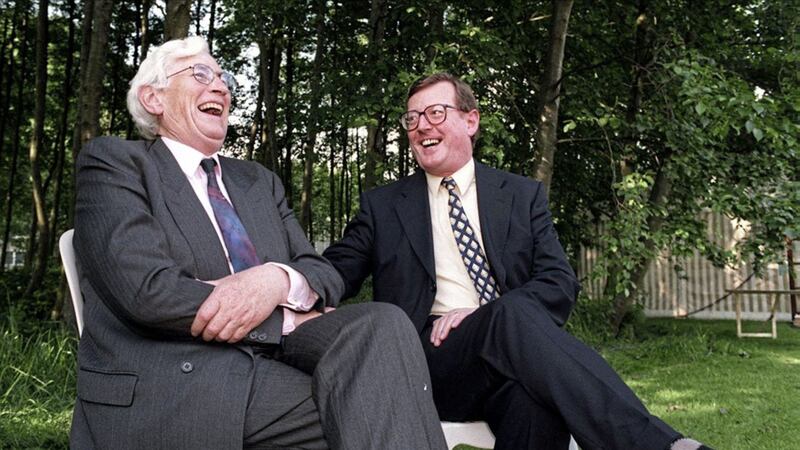THE last time I spoke to Seamus Mallon was on April 26 2019 when we were interviewed by RTE's Miriam O'Callaghan about the likelihood of Simon Coveney and Karen Bradley (and, as I always say, go ahead and Google the name if you need to be reminded who she was) being able to kick-start the talks process and reboot the Assembly.
Seamus's delivery was slower and his voice sounded tired, but his analysis and eloquence were as razor-sharp and considered as ever.
The occasional hint of a chuckle confirmed that his sense of humour - sometimes mischievous, sometimes dismissive - hadn't deserted him.
Neither of us were optimistic about the possibility of a breakthrough, but Seamus went on to make a broader point: "We shouldn't allow the Good Friday Agreement and structures to be manipulated by two parties, one of which threatened to smash the Agreement, while the other didn't have the courage to say in the final meeting (of the 1998 negotiations) that they fully supported it."
You could hear the sadness and frustration in his voice; understandably so.
The Agreement was something he had worked towards his entire political life, a framework, he hoped, which would allow unionists and nationalists to find a new way of living together and doing political business together.
Yet he saw it crumbling all around him, being destroyed by two parties which had never shared - so he believed - a common, collective commitment to work together for everyone in Northern Ireland.
Seamus and I would have differed on many political issues, local, national and international; but I never doubted his commitment to democracy, his detestation of any violence, or his desire for a more settled, cooperative Northern Ireland.
I accepted he wanted a united Ireland and he accepted that I was pro-Union; but we both agreed on the need to find a way of creating and sustaining genuine stability.
We had the occasional tiff - which goes with the territory in the relationship between a commentator and politician - yet he never bore a grudge and never refused my request for a 'quick word'.
The nature of politics is that the glory and the prizes often go to the biggest names rather than the hardest workers.
But it is worth remembering that it was Seamus who did the most difficult leg-work and heavy lifting when it came to implementing the early stages of the GFA and building the relationship with David Trimble (which wasn't easy).
John Hume was the figurehead and visionary of the SDLP; yet it was Seamus who did much of the everyday work in the background and oiled most of the machinery.
My personal view is that a Hume/Trimble combination would never have worked.
The Mallon/Trimble relationship (and I think it was Tom Kelly who described them, rightly, as 'the Odd Couple') wasn't always easy, but Seamus remained shoulder-to-shoulder with him during some very difficult times (the murder of the Quinn brothers, the Omagh bomb and another stand-off at Drumcree) after they were elected to the positions of First and deputy First Minister in July 1998.
What both men had in common (and I think Seamus was remembering it during that interview last April) was their joint desire to make the GFA work, while building on the hopes and opportunities which seemed apparent after the 1998 referendum.
Of course, Seamus wasn't always held in such high regard by party-political unionism.
His role as the SDLP's one-time spokesman on policing and justice meant that he was often critical of the RUC and UK policy, making him unpopular with both UUP and DUP politicians; yet it was also evident that their criticism was also offset by their acknowledgement that he was as fierce in his condemnation of the IRA as he was of loyalist paramilitaries.
And I know many unionists in the area where he lived - where most of his neighbours were unionists - who have always had enormous and genuine personal regard for him.
My one regret is that I never got to know him as well as I would have liked; never got to do that long, sit-down, in-depth interview we had mentioned a couple of times.
But I had observed him long enough to know that he was relentlessly serious and sincere in his decades-long commitment to making this place a better place.
And, by any yardstick of measurement, that's a pretty good legacy.








